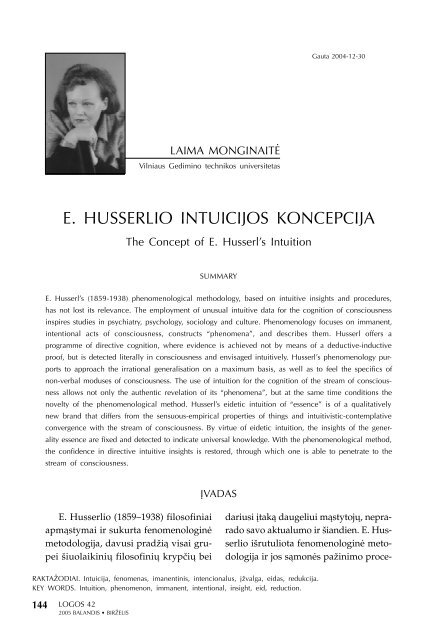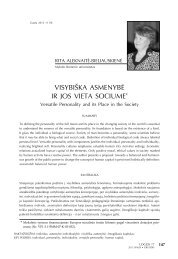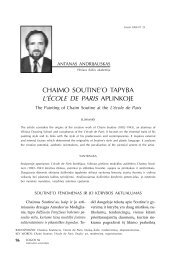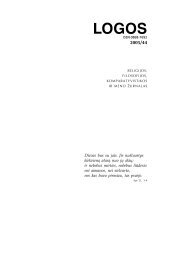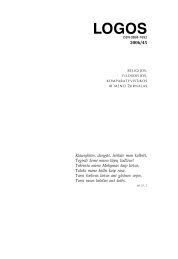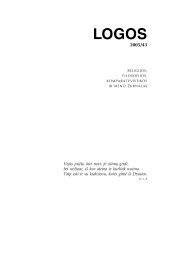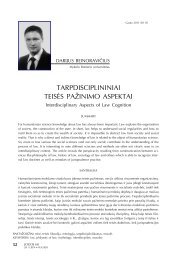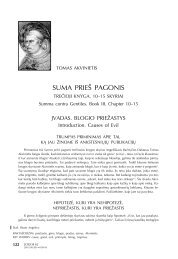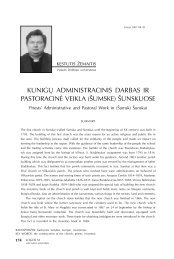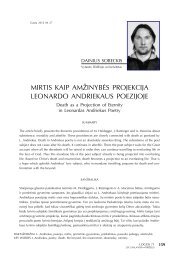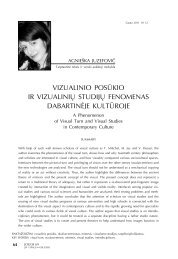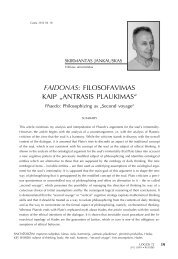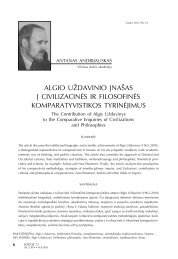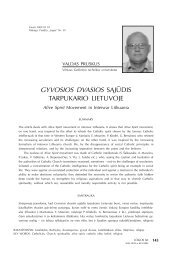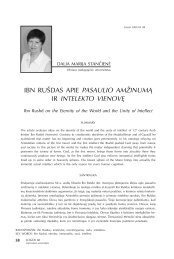Bet kvailas žmogus įgis supratimą, Kai laukinė a - Logos
Bet kvailas žmogus įgis supratimą, Kai laukinė a - Logos
Bet kvailas žmogus įgis supratimą, Kai laukinė a - Logos
You also want an ePaper? Increase the reach of your titles
YUMPU automatically turns print PDFs into web optimized ePapers that Google loves.
LAIMA MONGINAITË<br />
E. HUSSERLIO INTUICIJOS KONCEPCIJA<br />
144 LOGOS 42<br />
2005 BALANDIS • BIRÞELIS<br />
The Concept of E. Husserl’s Intuition<br />
SUMMARY<br />
E. Husserl’s (1859-1938) phenomenological methodology, based on intuitive insights and procedures,<br />
has not lost its relevance. The employment of unusual intuitive data for the cognition of consciousness<br />
inspires studies in psychiatry, psychology, sociology and culture. Phenomenology focuses on immanent,<br />
intentional acts of consciousness, constructs “phenomena”, and describes them. Husserl offers a<br />
programme of directive cognition, where evidence is achieved not by means of a deductive-inductive<br />
proof, but is detected literally in consciousness and envisaged intuitively. Husserl’s phenomenology purports<br />
to approach the irrational generalisation on a maximum basis, as well as to feel the specifics of<br />
non-verbal moduses of consciousness. The use of intuition for the cognition of the stream of consciousness<br />
allows not only the authentic revelation of its “phenomena”, but at the same time conditions the<br />
novelty of the phenomenological method. Husserl’s eidetic intuition of “essence” is of a qualitatively<br />
new brand that differs from the sensuous-empirical properties of things and intuitivistic-contemplative<br />
convergence with the stream of consciousness. By virtue of eidetic intuition, the insights of the generality<br />
essence are fixed and detected to indicate universal knowledge. With the phenomenological method,<br />
the confidence in directive intuitive insights is restored, through which one is able to penetrate to the<br />
stream of consciousness.<br />
E. Husserlio (1859–1938) filosofiniai<br />
apmàstymai ir sukurta fenomenologinë<br />
metodologija, davusi pradþià visai grupei<br />
ðiuolaikiniø filosofiniø krypèiø bei<br />
LAIMA MONGINAITË<br />
Vilniaus Gedimino technikos universitetas<br />
ÁVADAS<br />
RAKTAÞODIAI. Intuicija, fenomenas, imanentinis, intencionalus, áþvalga, eidas, redukcija.<br />
KEY WORDS. Intuition, phenomenon, immanent, intentional, insight, eid, reduction.<br />
Gauta 2004-12-30<br />
dariusi átakà daugeliui màstytojø, neprarado<br />
savo aktualumo ir ðiandien. E. Husserlio<br />
iðrutuliota fenomenologinë metodologija<br />
ir jos sàmonës paþinimo proce-


